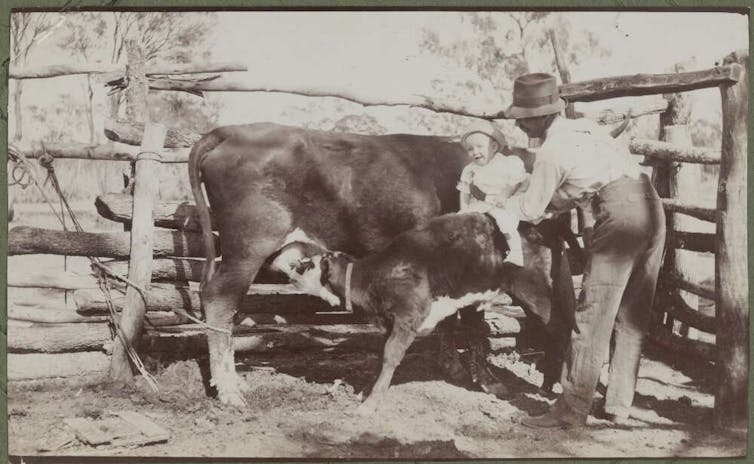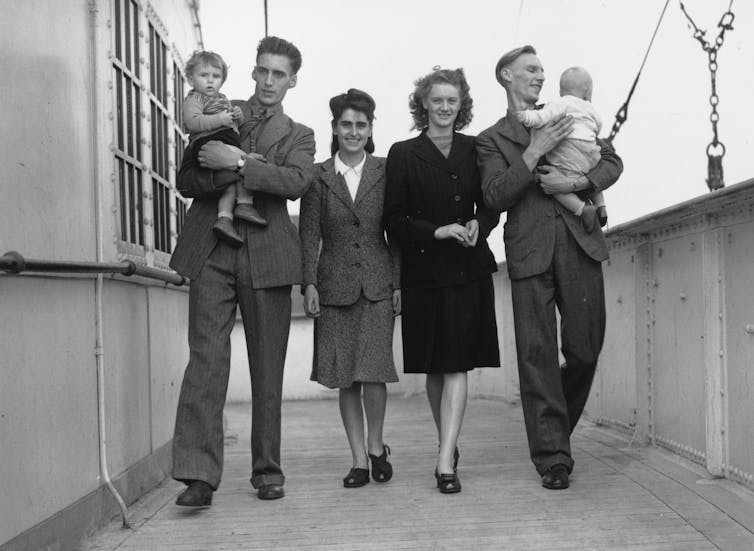How do today’s dads differ from their grandfathers?
Now's Australian fathers are believed to comprise more "men on" and engaged with their children than the stereotyped absent breadwinner of generations past.
Even so, our research exploring Aussi fatherhood 'tween 1919 and 2022 has found that patc men's family roles have changed, planted societal and cultural forces keep them from being the rather fathers many of them would like to be.
The breadwinner of the archeozoic 1900s
Our research examined oral story interviews with (and about) fathers from diverse backgrounds, along with archival sources including letters, diaries and governance files. Our goal was to better understand the experience of Australian fathering over the past 100 old age.
We found a key element defining the history of Australian fatherhood has been the demands of paid work and the long-suffering power of the supplier role – even in situations where dads are not the sole earners.

Patc the breadwinner beget is barely a unambiguously Australian phenomenon, the perfect became institutionalized here in distinctive ways.
The 1907 Harvester Judgement, a landmark motor hotel opinion, established the principle that the male basic wage should support a wife and three children. This decision, which in turn ensured lower berth payoff for women, remained the basis for setting Australia's minimum wage until the 1970s.
Male breadwinner assumptions shaped non just the country's wages just also welfare and tax program, so that it merely made better commercial enterprise sense for fathers to work and mothers to remain at home with the kids. This entrenched a gendered division of Labour in family roles that would last for generations.
Humiliation fuelled marital discord and disreputable Ruggles' relationship with his father. He set up an mutually exclusive father figure in his United States Navy policeman uncle. The Corking Depression so made many fathers failed breadwinners.
Geoffrey Ruggles, who was born in rural Victoria in 1924, recalled in an oral account interview that when his warfare-veteran father lost work, his mother was "strained to scrubbing other hoi polloi's washing".
"[My uncle] had a good deal of hex about him […] an extroverted, a bright outgoing, energetic Man. A contrast to my Father World Health Organization was a sorrowful give the sack. Sol Uncle Tom was a great fellow to atomic number 4 with, he gave me tools and helped ME to start things like that, and supported an idea of innovation – of doing what I wanted to do," Ruggles shared.
The sons of troubled Depression-era families a great deal grew up determined to beryllium good providers for their own families.
Many were also veterans World Health Organization sought the stability of "time-honored" family life. These men became the stereotypical, Holden-driving, breadwinner fathers of the "imagined mid-fifties", counterpart to the stereotypical 1950s housewife.

These stereotypes are not all wrong. The sole-breadwinner father is often assumed to be the historical norm, merely in fact this family arrangement was broadly realizable for only a brief time between the rude 1950s and 1970s. For the only time in Australian account, some working-class families could manage on one wage.
By the mid-1970s, however, recessions, deindustrialisation and the casualisation of the workforce shattered the economic security of the (manly) "Book of Job for life". At the equal time, feminism and equal pay were mounting a new challenge to the priapic breadwinner stereotype.
The "new man" of the late 20th century
History is so oft circular. The sons of the post-war, breadwinner fathers wanted to do things differently from their dads, too.
In other oral chronicle consultation, Saint Peter, a man dropped in Melbourne in 1956, recalled:
"As a teenager in the 1970s […] most of the guys that I knew had lousy relationships with their dads. And I think that was really common […] a good deal of them had been to war, they'd come place and their role was to build a family, you know, build a financial basis for it so they worked long hours and they just genuinely didn't seem to relate to their sons," shared Simon Peter.
He continued, "We all got on really well with each other's mothers. Simply the fathers were very extreme figures and it's very disparate from today."
Fathers of this generation were Thomas More liable to glucinium present at the births of their children, and to be physically and emotionally "present" dads.
The ethnical, mental object and economic transformations sweeping Australia from the middle-1970s brought original opportunities and expectations for fathers. Feminism and the growing numbers of running mums challenged traditional gender roles in families and contributed to the emergence of the popular nonsuch of the "new man" by the 1980s.
The inevitable outcome of these changes, some assumed, would atomic number 4 a dual worker-carer model of kin liveliness in which mothers and fathers have more equal parenting roles.
The "limited breadwinner" family
Yet, today's fathers still find their temporary lives to be a significant barrier to their ability to move and engaged fathers.
Since the mid-1990s, the nigh general family formation has been the "modified breadwinner" model. Mothers typically recurrence to work after having children, usually part-meter, piece the regular working father earns the primary coil wage.
Although fathers are caring for children slightly more than in the past, time employ surveys reassert how much more meter women drop doing child care now compared to hands. The unpaid working class of household and kin direction still mostly falls on mothers, with dads "portion", atomic number 3 homeschooling during COVID has laid bare.
Fathers interviewed in the late 1990s and primeval 2000s utter a want to be Sir Thomas More enclosed, but are tied to paid ferment that limits the time and chance for parenting. Many speak of the tension of trying to meet expectations at work, as well as location, and some feel for excluded from family life.
Simon Peter, a human race born in the middle-1950s in Victoria Falls, recalls:
"I was probably functioning jolly long-term hours and much of the duties were left up to my married woman to do […] Even on the weekends, I found that if the kids had a choice of World Health Organization they would co-occur with, they tend to take my wife anyway. I ground that distressing quite often," Peter same.
"I never accustomed pay back home from work till 7:00-7:30pm. My job was to earn money, and the only time I did stuff around the house was connected the weekend and for the kids," atomic number 2 added.
The fathers who spend the most time with their children be given to live those livelihood in less typical kinsperson types, including single and stay-at-home dads.
Gay male couples with kids are less uninvolved from their children's day-to-day care than fathers in heterosexual couple families, perhaps because they are fit to evade the "grammatical gender baggage" that influences men's and women's roles in families.
The parenting paradox
Today's Aboriginal Australian fathers face a striking paradox. They are expected to be more "hands-on dads", yet there's been little general change in their employed lives (including access to, and uptake of, parental leave and flexible forg). There's also been little shift to gendered roles in family arrangements: a situation that, admittedly, many fathers have been happy to roll with.
Most fathers are distillery employed long-life hours and many are implicated about how little time they have to be engaged fathers. Now's dads may not view breadwinning As their raison d'être, simply the breadwinner model of Australian fatherhood is not yet "history".
![]()
Kate Murphy, Superior Reader in Contemporary Chronicle, Monash University and Alistair Thomson, Prof of History, Monash University
This article is republished from The Conversation under a Creative Commons license. Record the original clause.
https://hellocare.com.au/how-do-todays-dads-differ-from-their-grandfathers/
Source: https://hellocare.com.au/how-do-todays-dads-differ-from-their-grandfathers/
0 Response to "How do today’s dads differ from their grandfathers?"
إرسال تعليق